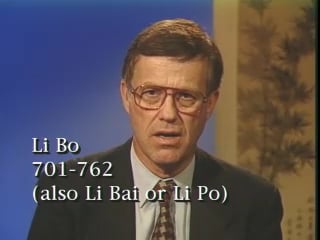Playlist: Great Tang Poets: Li Bo (701-762)
Li Bo, the “Outsider” Poet
Transcript
Robert Oxnam: Li Bo [Li Po in Wade-Giles romanization], also called Li Bai, is a second very well-known poet of the Tang, who endeared himself to readers as a free spirit with a unique persona.
Paul Rouzer: He grew up in southwestern China in Sichuan, probably from a merchant family. He was not terribly educated at first.
And when he traveled to the capital of the Tang dynasty, he found that he did not have the poetic training or the cultivation that many of the members of the elite Confucian class did at that particular time.
Stephen Owen: The Tang was an aristocratic society, and Li Bai was a nobody. He was someone with no real family background. He got an education, but it wasn't the right sort of education.
And Li Bai essentially had to sell himself. And he traveled through China introducing himself to people, presenting himself as this wild free, eccentric. And people in power in China liked to keep a couple of these around. It was considered sort of nice to have one. They entertained you. They were supposed to be wild and free, and so this was very much his self image.
Paul Rouzer: Li Bo deliberately exaggerated that particular quality of himself as an outsider. Unlike most of his contemporaries, who tended to write about poetry and its links to society, to politics and so forth, the continuing attraction of the Confucian life of service, Li Bo violently rejected those particular aspects, and instead embraced many other aspects — popular culture, Daoism, popular religion, all of the things which the supposed Confucian gentleman tended to avoid in his own daily life.
"Summer Day in the Mountains," by Li Bo*Lazily waving a fan of white feathers,
stripped naked here in the green woods.
I take off my headband hang it on a cliff
my bare head splattered by winds through pines.
*Li Bo's "Summer Day in the Mountains," translated by Stephen Owen, from The Norton Anthology of World Masterpieces, expanded edition. Maynard Mack, ed. (New York: W. W. Norton, 1995) p. 1311.
Involvement with Daoism and the Hanlin Academy
Transcript
Stephen Owen: The Daoist church gradually grew in China through the third to the seventh century, early Tang, and it brought together a lot of esoteric teachings, about heaven, the gods and esoteric mastery of how you could deal with the spirit world — alchemy, breath control, dietary control, sexual regimen — all matters of quasi-magical things by which human beings could work together with this Daoist vision of the cosmos.
The Daoist church honored, of course, among its ancestors, Laozi, the ancient philosopher, whose surname was supposed to be Li.
Now, when the Tang dynasty took over, it just so happened, the founder of the Tang dynasty had the surname Li. This was a very common surname for people of dubious background who came from central Asia. It's the same Li of Li Bai (or Li Bo) the poet. And the Tang emperor decided that in fact Laozi must be his ancestor.
And so you had already an established Daoist church, which now the government sought not only to control (remember that this is also to control the Daoist church), but to make it part of a state institution.
And Li Bai, quite naturally, probably with genuine interest, got involved with the Daoist church and was ordained actually in the Daoist church, even though he was never part of the real sort of workings of the hierarchy. And he was introduced to the emperor through his connection with Daoism. The emperor put him in a special part of the government called the Hanlin Academy.
Robert Oxnam: The "academy," here, was the group of scholars who drafted official documents for the empire. But the academy also included court entertainers, like jesters, dancers, and clowns. As a member of the academy, Li Bo created a persona for himself.
The Hanlin Academy ("hanlin" means "forest of scholars") was a scholarly institution that existed as well under later dynasties. Its scholars formed a carefully chosen elite whose expertise was at the service of the imperial government.
Unconventional Poetic Style
Transcript
Paul Rouzer: And unlike many of his contemporaries, who wrote in the so-called regulated verse form, the form that was limited to eight lines, Li Bo continued to write very, very long poems — poems that sort of sprawl all over the place.
In fact, it was this quality of loquaciousness that earned Li Bo a reputation of being a sort of wild man in the eighth century, and made him particularly popular.
Li Bo himself wrote a good deal about drinking, about encountering Daoist immortals, whom he insisted he had met personally, and basically his own activities as a "knight errant" in traditional China where he supposedly went about with a sword in hand righting wrongs throughout the Chinese empire.
Stephen Owen: But he is popular because precisely of that extravagance. If there is this aspect of Chinese society which is fascinated with good behavior, as in our own society, so also there is a delight in those people who break free or perform the idea of breaking free.
And Li Bai loved to perform that person who did what he pleased, who disdained the conventions of the world, who lay down and got drunk and laid down drunk wherever he felt like it, who snubbed the emperor, who went before the emperor drunk and wrote out his poems quick as a flash, that kind of performative sort of a person we all wish we were in some ways. And so this is part of China too.
Drinking Alone under the Moon
Transcript
"Drinking Alone under the Moon," by Li BoAmong the flowers, a single jug of wine;
I drink alone. No one close to me.
I raise my cup, invite the bright moon;
facing my shadow, together we make three.
The moon doesn't know how to drink;
and my shadow can only follow my body.
But for a time I make moon and shadow my companions;
taking one's pleasure must last until spring.
I sing — the moon wavers back and forth.
I dance — my shadow flickers and scatters.
When I'm sober we take pleasure together.
When I'm drunk, we each go our own ways.
I make an oath to journey forever free of feelings,
making an appointment with them to meet in the Milky Way afar.
[Translation by Paul Rouzer]
Paul Rouzer: A good example of one of Li Bo's poems is his famous "Drinking Alone under the Moon." Drinking alone, itself, is an unusual topic for a Chinese poem, because the ancient Chinese tended to be very sociable drinkers.
Nobody would ever drink by himself. He would only drink at parties with other people. And so, for Li Bo to talk about drinking alone was a particularly striking topic for him to choose.
And the only way that he can deal with this drinking alone is to create for himself companions. And finding himself alone in this poem, he creates his own companions in an act of incredible creative pride and egotism.
Li Bo himself was particularly attractive to many of the Chinese readers of his time, because he seized upon the essential idea of Chinese poetics — the idea that Chinese poem was a spontaneous expression of the self — and elaborated on it, until he created an extremely overbearing, powerful persona for himself, quite unlike any sort of persona that had existed in Chinese poetry up to that point.
About the Speakers
Robert B. Oxnam
President Emeritus
Asia Society
Stephen Owen
James Bryant Conant University Professor; Professor of Comparative Literature
Harvard University
Paul Rouzer
Associate Professor, Department of Asian Languages and Literatures
University of Minnesota
Bibliography
The Art of Chinese Poetry
By James J. Y. Liu
Chicago: The University of Chicago Press, 1962
The Columbia Book of Chinese Poetry: From Early Times to the Thirteenth Century
Translated and edited by Burton Watson
New York: Columbia University Press, 1984
The Great Age of Chinese Poetry: The High T’ang
By Stephen Owen
New Haven: Yale University Press, 1981
Poems of the Late T’ang
Translated by A. C. Graham
Baltimore: Penguin Books, 1965
The Poetry of the Early T’ang
By Stephen Owen
New Haven: Yale University Press, 1977
“Tang Poetry: A Return to Basics”
By Burton Watson
In Masterworks of Asian Literature in Comparative Perspective, edited by Barbara Stoler Miller
Armonk, N.Y.: M.E. Sharpe, 1994
Related Videos
Introduction to Tang Poetry
Great Tang Poets: Wang Wei (699-761)
Great Tang Poets: Du Fu (721-770)








